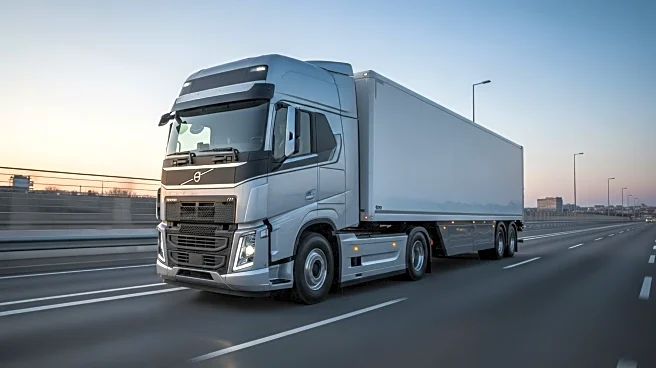What is the story about?
What's Happening?
Einride, a technology company specializing in digital, electric, and autonomous road freight solutions, has successfully operated a fully autonomous heavy-duty truck on a public road in Belgium. This milestone was achieved at the Port of Antwerp-Bruges under the Belgian regulatory framework, showcasing Belgium's potential leadership in autonomous freight technology. The demonstration involved Einride's proprietary Autonomous Drive Stack, a cabless autonomous truck, and an intelligent fleet management platform called Control Tower. The event highlighted the collaboration between public and private sectors to advance safer, more efficient, and sustainable logistics solutions. The European Commission has recognized autonomous vehicles as crucial for EU competitiveness, and this demonstration aligns with European ambitions for innovative, scalable, and sustainable mobility solutions.
Why It's Important?
The successful operation of a fully autonomous heavy-duty truck marks a significant advancement in logistics technology, potentially transforming the industry by reducing reliance on human drivers and enhancing efficiency. This development is crucial for decarbonizing logistics and securing supply chains, as autonomous vehicles can offer more sustainable transport solutions. The demonstration at the Port of Antwerp-Bruges underscores the port's role as a testing ground for future mobility innovations, strengthening its position as a world port. The initiative also supports Europe's ambitions to lead in automated mobility solutions, which could drive economic growth and competitiveness. Companies across North America, Europe, and the Middle East could benefit from Einride's scalable autonomous technology, offering cost-efficient logistics solutions.
What's Next?
The demonstration sets the stage for further deployments of autonomous freight technology across Europe and potentially in the U.S. Einride's success in securing permits and achieving first-of-their-kind deployments suggests a growing acceptance and integration of autonomous vehicles in logistics. As regulatory frameworks evolve, more ports and logistics hubs may adopt similar technologies, enhancing operational efficiency and sustainability. The collaboration between public and private sectors will likely continue to drive innovation, with potential expansions of autonomous vehicle operations in other regions. Stakeholders, including government agencies, logistics companies, and environmental groups, may engage in discussions to further develop and implement autonomous freight solutions.
Beyond the Headlines
The deployment of autonomous trucks raises ethical and legal considerations, such as the impact on employment in the logistics sector and the need for robust safety regulations. As autonomous technology becomes more prevalent, there may be shifts in workforce dynamics, requiring retraining and adaptation for those affected. Additionally, the integration of autonomous vehicles into existing infrastructure poses challenges that must be addressed to ensure seamless operations. Long-term, the adoption of autonomous freight solutions could lead to significant reductions in carbon emissions, contributing to global sustainability goals.















